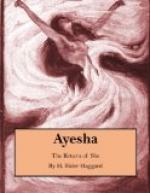“This is written:—For me, death, whereat I rejoice. For thee a spear cast by thine own hand. For the land of Kaloon blood and ruin bred of thee!
“Atene,
“Khania of Kaloon.”
Ayesha listened in silence, but her lips did not tremble, nor her cheek pale. To Oros she said proudly—“Say to the messenger of Atene that I have received her message, and ere long will answer it, face to face with her in her palace of Kaloon. Go, priest, and disturb me no more.”
When Oros had departed she turned to us and said—“That tale of mine of long ago was well fitted to this hour, for as Amenartas prophesied of ill, so does Atene prophesy of ill, and Amenartas and Atene are one. Well, let the spear fall, if fall it must, and I will not flinch from it who know that I shall surely triumph at the last. Perhaps the Khania does but think to frighten me with a cunning lie, but if she has read aright, then be sure, beloved, that it is still well with us, since none can escape their destiny, nor can our bond of union which was fashioned with the universe that bears us, ever be undone.”
She paused awhile then went on with a sudden outburst of poetic thought and imagery.
“I tell thee, Leo, that out of the confusions of our lives and deaths order shall yet be born. Behind the mask of cruelty shine Mercy’s tender eyes; and the wrongs of this rough and twisted world are but hot, blinding sparks which stream from the all-righting sword of pure, eternal Justice. The heavy lives we see and know are only links in a golden chain that shall draw us safe to the haven of our rest; steep and painful steps are they whereby we climb to the alloted palace of our joy. Henceforth I fear no more, and fight no more against that which must befall. For I say we are but winged seeds blown down the gales of fate and change to the appointed garden where we shall grow, filling its blest air with the immortal fragrance of our bloom.
“Leave me now, Leo, and sleep awhile, for we ride at dawn.”
It was midday on the morrow when we moved down the mountain-side with the army of the Tribes, fierce and savage-looking men. The scouts were out before us, then came the great body of their cavalry mounted on wiry horses, while to right and left and behind, the foot soldiers marched in regiments, each under the command of its own chief.
Ayesha, veiled now—for she would not show her beauty to these wild folk—rode in the midst of the horse-men on a white mare of matchless speed and shape. With her went Leo and myself, Leo on the Khan’s black horse, and I on another not unlike it, though thicker built. About us were a bodyguard of armed priests and a regiment of chosen soldiers, among them those hunters that Leo had saved from Ayesha’s wrath, and who were now attached to his person.
We were merry, all of us, for in the crisp air of late autumn flooded with sunlight, the fears and forebodings that had haunted us in those gloomy, firelit caves were forgotten. Moreover, the tramp of thousands of armed men and the excitement of coming battle thrilled our nerves.




